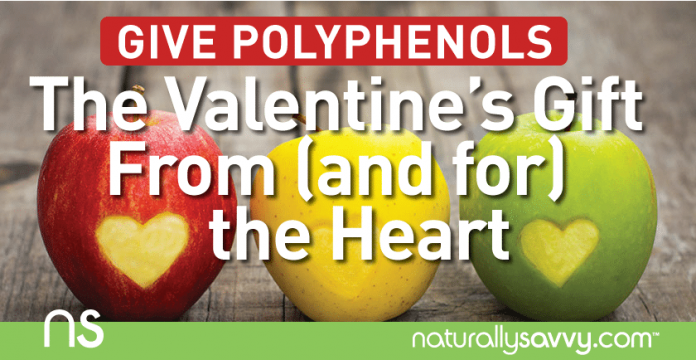
This Valentine’s Day, consider giving a healthy foods gift of polyphenols-from the heart and for the heart-to your loved one. If this doesn’t sound very romantic, read on to find out exactly what you can include in your heart-friendly gift basket for your loved one and why making this choice is so important.
First, polyphenols is a broad term for thousands of different micronutrients, most of which are found naturally in foods. They are grouped according to their structure and then further divided into subgroups. Among the more commonly recognized polyphenols are flavonoids, stilbenes, lignans, anthocyanins, and flavanols (e.g., catechins).
According to a recent study published in the journal Nutrition, Metabolism and Cardiovascular Disease, consuming certain polyphenols can reduce the risk of developing cardiovascular disease by up to 46 percent. In fact, this study was the first to comprehensively examine the relationship between intake of polyphenols and the incidence of cardiovascular disease.
Read more about cardiovascular health
To arrive at their conclusion, the authors evaluated data from 7,172 individuals over an average of 4.3 years and who completed an extensive food questionnaire, with a focus on polyphenol consumption. A total of 273 people were diagnosed with cardiovascular disease during the study period.
After analyzing the data, the researchers determined there was a 46 percent reduction in risk of cardiovascular disease when they compared individuals who consumed the most polyphenols, which are potent antioxidants, with those who consumed the least. The polyphenols associated with the greatest reduction of risk were flavanols, lignans, and hydroxybenzoic acids.
Therefore, if you want to give a heart-healthy Valentine’s Day gift, you might put together a lovely basket that contains some of the following healthy foods:
Flavanols: Apples, grapes, pears, cocoa/chocolate (dark is best), green tea, and wine.
Lignans: Flaxseeds are by far the best source, followed by sesame seeds. Kale, broccoli, and apricots provide smaller amounts.
Hydroxybenzoic Acids: Cocoa, tea, wine, and vanilla are the best sources.
Read about chocolate for your heart
When choosing your gift items, remember that other fruits and vegetables also are good sources of these and other polyphenols and beneficial nutrients. In fact, other research indicates that berries are an excellent choice for heart health. In a study entitled “Berries: emerging impact on cardiovascular health,” the authors reported that research conducted using chokeberries, blueberries, cranberries, and strawberries, all of which are rich in the polyphenol known as anthocyanin, showed significant improvements in factors associated with cardiovascular health.
Also look for organic and non-GMO products and keep “moderation” in mind. That is, just because cocoa is on the list doesn’t mean a big box of chocolates is the best Valentine’s gift. Perhaps a basket containing dried apricots, fresh apples, a piece of dark chocolate, a tin of green tea, and a bottle of wine would make a nice gift.
Read about the dangers of GMOs
Another idea is to make a meal that includes many of these heart-healthy foods. Of course, now that you know which foods and polyphenols are good for the heart, be sure to make them a regular part of your diet and that of your loved ones.
Cardiovascular disease includes stroke, heart attack, arrhythmia, atherosclerosis, heart failure, and heart valve problems, among others. Heart disease is the leading cause of death in the United States among both men and women. A diet that focuses on healthy foods, along with regular exercise and stress management, are critical for the prevention and treatment of cardiovascular disease. For Valentine’s Day and every day, be sure to include foods rich in polyphenols.




